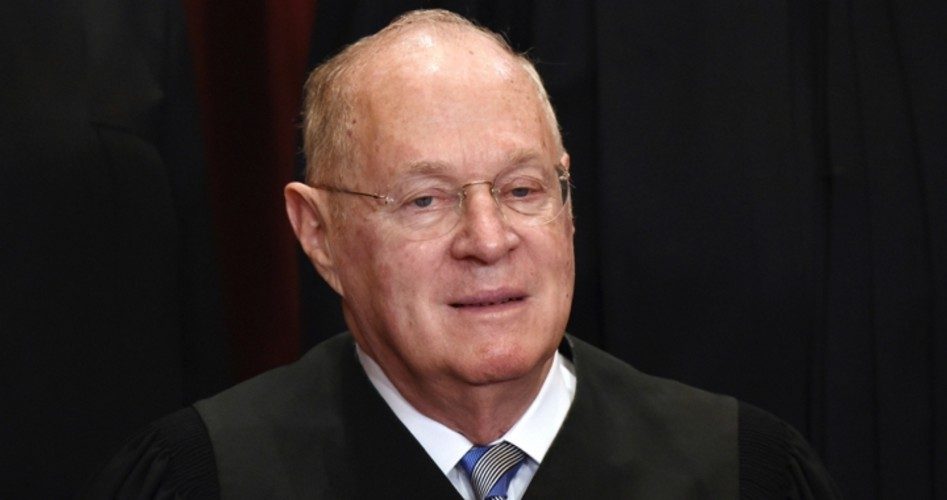
Justice Anthony Kennedy (shown), the 81-year jurist known as the Supreme Court’s “swing vote,” announced Wednesday his retirement from the bench. Kennedy’s exit marks the end of a 31-year High Court career and, hopefully, the beginning of more constitutionally sound SCOTUS opinions. As NBC News reports:
Supreme Court Justice Anthony M. Kennedy announced Wednesday that he will retire at the end of next month, preparing the way for the most significant change in the court’s makeup in half a century.
The vacancy will allow President Donald Trump to make the U.S. Supreme court a solidly conservative body for years, if not generations, to come — a towering legacy of his time in office.
Trump said Wednesday shortly after Kennedy’s announcement that a search for his replacement would begin immediately and he thanked the justice for his service.
A spokesman for Senate Majority Leader Mitch McConnell, R-Ky., said he saw no reason why a new justice couldn’t be confirmed before the midterm elections in November. McConnell himself said on the Senate floor that the vote to confirm Kennedy’s successor would take place “this fall.” [Video on Kennedy’s retirement below]
NBC News’ reportage reflects, sadly, our generally flawed conception of the courts’ role. Speaking of the significance of whether a justice is “liberal” or “conservative” makes as much sense as emphasizing whether a baseball umpire is liberal or conservative. In neither case does the individual’s legitimate role involve imposing his own biases, but to apply the rules. These are found in baseball’s rulebook in the umpire’s case — in the Constitution in the judge’s.
Unfortunately, the Constitution has too often appeared an afterthought for Kennedy, a document to be rationalized away when inconvenient. Being a “swing vote” makes one sound to many ears open-minded and independent, but the only thing Kennedy has been independent of is principle.
In 2008, American Thinker outlined some of the justice’s many low points. Yet perhaps his least fine hour was his authoring of the 2015 Obergefell v. Hodges marriage opinion, which dissenting justice Antonin Scalia correctly wrote is “lacking even a thin veneer of law” and for this reason is a “threat to American democracy.” Chief Justice John Roberts chimed in, saying that no one should “celebrate the Constitution” in the decision’s wake because the Constitution “had nothing to do with it.” What the decision did have to do with is five lawyers’ judgment that, as Roberts also wrote, “same-sex marriage is a good idea.”
Indeed, Kennedy’s Obergefell opinion read like an activist or legislator trying to change law, not a judge applying it. He wrote, for example, that without “the recognition, stability, and predictability marriage offers, their children suffer the stigma of knowing their families are somehow lesser. They also suffer the significant material costs of being raised by unmarried parents, relegated through no fault of their own to a more difficult and uncertain family life. The marriage laws at issue here thus harm and humiliate the children of same-sex couples.” He also opined that for homosexuals “and their children the childhood years will pass all too soon.”
Whether the above is true or not isn’t currently the issue. Rather, the exact same points could be made about the children of polygamous parents. Must “plural marriage” be recognized, too? Kennedy was acting not as an adjudicator but a legislator.
Yet he merely reflects a wider problem. In this relativistic/nihilistic age, where everything is considered shades of gray, just mere perspective, even the Constitution is viewed as relative — as a “living document.” To illustrate this position’s lunacy, consider an elaboration upon the earlier sports analogy. As I wrote last year:
Judges can in fact be likened to baseball umpires, while the players are the people, the game’s ruling body is the legislature, and the rule book is the Constitution.
Now, if a rule is thought inadequate, it’s the ruling body’s role to change it. Of course, the players, the umpires, or anyone else may lobby passionately in that regard. What, however, if an umpire considered the rule book living and said, “With the great pitchers in these times, three strikes are insufficient; I’m giving the batter four strikes”?
He’d be fired. And would it help his cause if he added an intellectual veneer to his cheating, saying, “You don’t understand! I’m not a radical like those originalists! I’m moderate — a pragmatist”?
No, he’s a bad umpire — and he’d be history.
Likewise, forget about conservative and liberal judges; forget about “pragmatists,” “constructionists,” and “textualists.” Such terms are the fruits of pseudo-intellectualism and legal legerdemain and muddy the waters. There are only two kinds of judges.
Good judges and bad judges.
Good judges do their job: ruling based on the original intent of the framers as expressed via the Constitution.
Bad judges do what Kennedy has.
Since the Constitution as living document means a dying republic, hopefully Kennedy’s replacement will be, as most suppose, an improvement. But this is never guaranteed. Note that Kennedy himself was appointed by none other than Ronald Reagan.
So hopefully President Trump will be divinely led, for nowhere does the swamp need greater draining than in the judiciary.
Photo of Justice Kennedy: AP Images



